Browse
Agri Food Systems
Agri4D 2021 conference "Food Systems for New Realities"
The Agri4D 2021 conference "Food Systems for New Realities" will take place at SLU (virtually) on 28-30 September. The Agri4D conference has been Organised by SLU Global at the Swedish University of Agricultural Sciences (SLU) and the Swedish International Agriculture Network Initiative (SIANI), with support from the Swedish International Development Cooperation Agency (Sida). Agri4D will bring together researchers, policy makers and practitioners to engage actively with the challenges of food systems with a focus on low-income contexts in a globalised world. The conference aims to be a platform to take stock of the current knowledge frontier, connect science to policymaking and practice, and spark new collaborations.
For more information please visit: https://www.slu.se/en/collaboration/international/slu-global/agri4d-conference/.
To register:
Agri4D - Agricultural Research for Development Conference 2021 (akademikonferens.se)
By:
Raquel Acosta
Thursday, Sep 23, 2021
AGRI-FOOD SYSTEMS
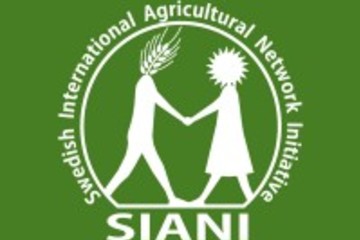
Leave a comment
2021 Africa Agriculture Status Report
AAP would like to highlight MSU Assistant Professor and Coordinator of the AAP/GYAN Youth Transformation Platform Kwame Yeboah’s recent collaboration with colleagues from @Making Cents International and the @Bureau of Integrated Rural Development at the Kwame Nkrumah University of Science and Technology, Ghana, to author Chapter 8 of the report: "Capturing the Synergies Between Youth Livelihoods and Resilient Agri-food Systems". During this meeting, Kwame Yeboah and AAP partners discussed many issues facing agri-food system development in Africa. Some of these topics included:
Building sustained and resilient agri-food systems in Africa.
The impacts of youth livelihoods in Africa that are intricately intertwined with the performance of the agri-food systems.
How to foster youth engagement.
Address policies that facilitate youth access to productive resources.
Harnessing youth potential for resilient agri-food systems.
AAP recognizes the significance of the Africa Agricultural Status Report and continues to share our support for Assistant Professor Kwame Yeboah’s work on these vital topics.
By:
Raquel Acosta
Thursday, Sep 23, 2021
AGRI-FOOD SYSTEMS

Leave a comment
The Milken-Motsepe Prize in AgriTech
The inaugural Milken-Motsepe Prize focuses on accelerating progress towards Sustainable Development Goals (SDGs) 1 and 2: no poverty and zero hunger. The Milken-Motsepe Prize in AgriTech is a global competition for innovative solutions to increase economic value to farmers, from seed to sale. Registration is open to anyone.Winning teams will increase net economic value to small and medium-sized farms by:
Developing innovative technology solutions for any stage of the food system, from seed to sale
Designing a viable business model
Increasing farm productivity and/or decreasing post-harvest loss
Registration is free and open to anyone, with a $1 million grand prize available for the winning team, and $1 million in additional prizes.
For more information or to apply, please visit the Milken-Motsepe Prize webpage.
By:
Derek Tobias
Monday, Sep 20, 2021
AGRI-FOOD SYSTEMS
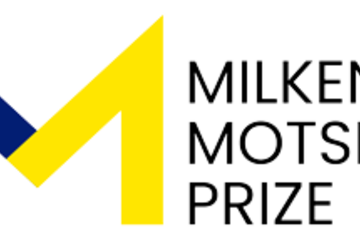
Leave a comment
UN Food Systems Summit High Level Side Event Delivering on the African Agenda in Building Resilient
During the 2021 AGRF Summit 6-10 September, six African presidents joined by 8,000 delegates aligned with the African common position on building resilient food systems. Their shared vision will help achieve a transformation to improve livelihoods, defeat hunger and tackle malnutrition.
To highlight the national pathways and partner actions, on September 21 from 6–7:30 PM (EAT) AGRA and the AGRF will host “Delivering on the African Agenda in Building Resilient Food Systems” a side event ahead of the UN Food Systems Summit. It will address African challenges and solutions in the transition to resilient food systems. Following the declaration (https://agrf.org/summit#summit-declaration) of the AGRF, it will consider what must be done to turn political ambition into reality.
The event will be moderated by William Asiko, Managing Director of the Rockefeller Foundation’s Africa Region Office.
Provisional speakers include:
H.E. Hailemariam Dessalegn, Former Prime Minister of Ethiopia, Chair AGRF Partners Group and Chair AGRA Board
Jim Barnhart, Assistant to the Administrator, Bureau for Resilience and Food Security, USAID
Ms. Evangelista Chekera, CEO Passion Poultry
Hon. Peter Munya, Cabinet Secretary, Ministry of Agriculture, Livestock, Fisheries and Cooperatives, Republic of Kenya
Elizabeth Nsimadala, President, Pan-Africa Farmers Organization (PAFO)
H.E. Ken Ofori-Atta, Minister for Finance and Economic Planning, Republic of Ghana
H.E. Josefa Sacko, Commissioner Agriculture, Rural Development, Blue Economy and Sustainable Environment, African Union Commission
Jai Shroff, UPL Limited CEO
Rodger Voorhies, President, Global Growth and Opportunity Division, Bill and Melinda Gates Foundation
Please join us on September 21 at 6pm EAT (Nairobi time).
Click here to register for the event.
By:
Derek Tobias
Monday, Sep 20, 2021
AGRI-FOOD SYSTEMS
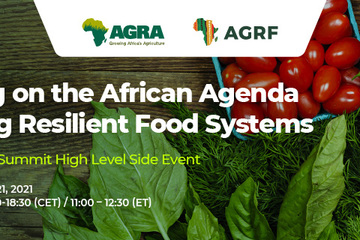
Leave a comment
East and Southern Africa Fertilizer Financing Forum
The Africa Fertilizer Financing Mechanism (AFFM), in collaboration with the African Fertilizer and Agribusiness Partnership (AFAP) and AFRIQOM, will be hosting the first virtual edition of the East and Southern Africa Fertilizer Financing Forum on Thursday, 28 October 2021.
The event has been themed “Strengthening Regional Collaboration to Finance Fertilizer in the Agribusiness Value Chain”, and will facilitate the identification of opportunities for building and fostering partnerships with sectorial stakeholders in order to enhance access to finance and agricultural productivity in East and Southern Africa.
The East and Southern Africa Fertilizer Financing Forum will bring together regional member countries, regional and international development and commercial financial institutions, farmers, private sector, and non-governmental organizations.
The goal will be for participants to deliberate on potential solutions to existing bottlenecks to fertilizer financing. Delegates will also discuss ways to scale up funding in the region by leveraging the African Continental Free Trade Area (AfCFTA) initiative and other existing success stories.
Click here to register for the event
By:
Derek Tobias
Thursday, Sep 9, 2021
AGRI-FOOD SYSTEMS
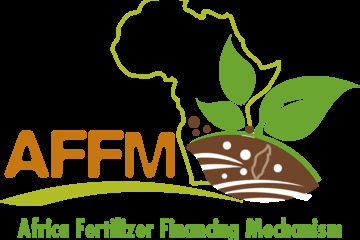
Leave a comment
AGRF 2021 Summit: Agricultural Transformation for Sustainable and Resilient Food Systems
AAP is excited to announce the “Agricultural Transformation for Sustainable and Resilient Food Systems” session at The AGRF Pre-Summit event on Monday, September 6th. AGRF and its partners organized a three-day summit, September 7-10 around the theme of “Pathways to Recovery and Resilient Food Systems,” and this will be just one of the many important discussions occurring. The AGRF 2021 Summit is a defining moment in highlighting and unlocking the policy, and financial commitments and innovations the continent has made and that it continues to work towards achieving. AAP recognizes the importance of these sustainable development goals and is looking forward to the participation of our colleagues throughout the Summit.
Register for this year’s summit: https://agrf.org/
By:
Raquel Acosta
Saturday, Sep 4, 2021
AGRI-FOOD SYSTEMS
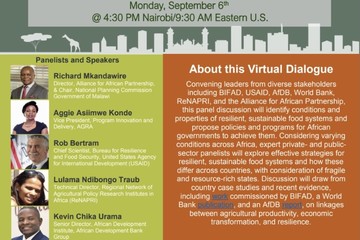
Leave a comment
AGRF 2021 Summit
AAP Africa Office Associate Director, Isaac Minde, will be moderating the “Youth and Agri-food System’s Resilience in Africa” session at The AGRF Summit Pre-Day event on Sept. 6th. AGRF and its partners organized a three-day summit, September 7-10 around the theme of “Pathways to Recovery and Resilient Food Systems”. The AGRF 2021 Summit is a defining moment in highlighting and unlocking the policy, and financial commitments and innovations the continent has made and that it continues to work towards achieving. AAP recognizes the importance of these sustainable development goals and is looking forward to the participation of our colleagues throughout the Summit.
Register for this year’s summit: https://bit.ly/3xVWZp2
By:
Raquel Acosta
Friday, Sep 3, 2021
AGRI-FOOD SYSTEMS
+1
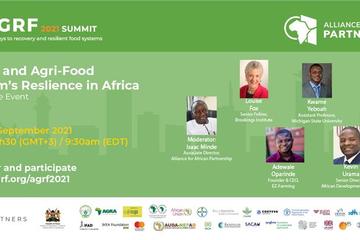
Leave a comment
[RUFORUM Press Release] Seventh African Higher Education Week and RUFORUM Triennial Conference
Kampala 17 August 2021: The Regional Universities Forum for Capacity Building in Agriculture (RUFORUM) is pleased to announce the Seventh African Higher Education Week and RUFORUM Triennial Conference that will be hosted by the Government of the Republic of Benin in partnership with the University of Abomey Calavi, University of Parakou and the National University of Agriculture, from the 06th – 10th December, 2021 at Palais des Congres de Cotonou, Benin.
The Seventh African Higher Education Week and RUFORUM Triennial Conference will run under the theme “Operationalising Higher Education for Innovation, Industrialisation, Inclusion and Sustainable Economic Development in Africa: A Call for Action”
The conference will bring together participants from across Africa and the world to discuss how African universities are working toward improving their mandates of training, research and outreach, to produce innovations and entrepreneurial youth that meet the demands in the global competitive market. The participants will be drawn from Universities, Civil Society Organizations-CSOs, National and International Research Organizations, Development Partners, Governments, Continental and Regional Organizations, African Union Commission, Food and Agriculture Organization (FAO), Non-Governmental Organizations, the Private sector, farmers & farmer representatives, emerging & early career researchers, and young entrepreneurs from especially Benin and other West African countries. Universities, private sector actors and young entrepreneurs will have the opportunity to showcase their innovations, products and services. Due to the restrictions and risks associated with the COVID-19, African Higher Education Week and RUFORUM Triennial Conference is being organized using a blended approach, which will include both face-to-face and virtual meetings.
RUFORUM will recognise farmers that have made significant contribution to agricultural transformation in Benin as a way of supporting national advancement and transformation of agriculture. RUFORUM shall also recognise scientists and other actors that have made significant contribution and supported the advancement of excellence in research and higher education for the development of Africa. Young Innovators and Entrepreneurs from Benin will be recognised to promote the contribution of the youth to the economic development of Africa and to provide youth with the forum to demonstrate their innovations.
The Conference will be preceded by several virtual side events including: Scientific Data Management training for Post-Graduate Students Using R Programming Language, Evaluating the Impact of Entrepreneurship in Agribusiness Training, Social media training for students, Interdisciplinary Training for Early Career Scientists & doctoral students, and a business & entrepreneurship training for Young Innovators and entrepreneurs.
This year, because of the COVID-19 restrictions and risks associated with travel during this period, it will not be possible for all delegates to travel to Benin to participate. Therefore, some delegates will be requested to participate virtually through an online platform. We have therefore designed the attendance Questionnaire for RUFORUM Triennial Conference 2021 to enable the organizers know your preference in terms of traveling to Benin or attending the event face to face or virtually. We will also be happy to get essential information about you to enable effective planning.
This questionnaire is expected to take not more than 7 minutes of your time.
Learn more: https://ruforum.wordpress.com/2021/08/19/press-release-seventh-african-higher-education-week-and-ruforum-triennial-conference/?utm_source=RUFORUM+Mailing+List&utm_campaign=d18db56afe-RUFORUM+Weekly+-+Vol.3+No.25_COPY_01&utm_medium=email&utm_term=0_1fcfbb8a0b-d18db56afe-346973753&ct=t()&goal=0_1fcfbb8a0b-d18db56afe-346973753&mc_cid=d18db56afe&mc_eid=d95cf18a8d
By:
Madeleine Futter
Thursday, Aug 26, 2021
AGRI-FOOD SYSTEMS
+2

No Preview Available
Leave a comment
Discretionary Funding Initiative (DFI)
The Discretionary Funding Initiative (DFI), funded by the Michigan State University Foundation, provides bridge funds for tenure stream faculty for additional studies needed for resubmission of an unsuccessful, but nearly fundable, grant application to the same program within a funding agency.
To request funding from this program, faculty should submit a proposal via the grant proposal system. Applicants will be expected to provide copies of their previous external reviews, if applicable, and describe the work that will be completed to address the comments provided in those documents. The research associate dean of the applicant's college (lead college if appointed in multiple colleges) will review applications, and submit a prioritized list to the Office for Research and Innovation (OR&I). Requests for support approved by the research associate deans will be reviewed by the OR&I.
The maximum award from OR&I will be $25K and will require a 100% (up to $25K) match from units or colleges. Funds will be available for 18 months.
For more information or to apply, click here.
By:
Derek Tobias
Thursday, Aug 19, 2021
AGRI-FOOD SYSTEMS
+5

Leave a comment
Nice to be back
By:
Obinna Anyanwu chidi
Tuesday, Aug 17, 2021
AGRI-FOOD SYSTEMS
+2
Leave a comment
I wish to share this joy with you all on my article winning the article of the year 2020 award. Feel free to download, read, cite and share
https://onlinelibrary.wiley.com/doi/10.1002/leg3.25
By:
Dr. Oluchukwu Margaret Mary Nwadi
Tuesday, Aug 17, 2021
AGRI-FOOD SYSTEMS

Leave a comment
South-North Programme for Exchanges and Collaborations
The UNTBLDC-TWAS-ICGEB South-North Programme for Exchanges and Collaborations provides scientists from LDCs who hold a MSc, preferably a PhD, and who are maximum 45 years old, with the opportunity to pay a visit to ICGEB laboratories in Trieste, Italy, for the duration of 6 months maximum. The aim of the visit is to provide the opportunity to become acquainted with the scientific process, including how to develop a research project and take it to a successful conclusion and how to teach, train and transfer knowledge to younger students and researchers. Moreover, scientists will be exposed to an international scientific environment which will be an asset in the progression of their careers and will also positively impact their institution of origin.
The United Nations Technology Bank for Least Developed Countries, through TWAS, will cover travel expenses and provide subsistence costs for the stay in Italy, while the International Centre for Genetic Engineering and Biotechnology, as host institution, will provide the laboratory facilities and the research support.
The administration and financial operation of TWAS is undertaken by UNESCO in accordance with an agreement signed by the two organizations.
Eligibility
Applicants must be a maximum age of 45 years on 31 December of the application year;
Applicants must have a MSc, preferably a PhD;
Applicants must be living and working in a Least Developed Country (LDC);
Women scientists are especially encouraged to apply;
Proposals need to be on projects relevant to ICGEB Trieste:
Non communicable diseases (cardiovascular disorders; cancer; immunology; neurodegeneration; genetic disease);
Human viral diseases (dengue, chikungunya, zika, tick-borne encephalitis viruses, Covid19);
Biotherapeutics and Biosimilars;
Plant biotechnology and microbiome studies;
Computational Biology.
Submitting your application
Applicants must complete the online application form by clicking on the 'Apply now' button at the bottom of this page. While filling in the online application, applicants also need to upload the following documentation:
scanned copy of your passport, even if expired (page with your name and surname);
CV, maximum two pages including a list of your 6 best publications;
A recent invitation letter from the ICGEB host Professor – on the host institution’s letterhead paper – which should contain the proposed time of the visit (up to 6 months) and should refer to the proposed cooperation. It should be made evident that the applicant and the proposed host have been in contact regarding the scientific work to be done during the visit and that the conditions for conducting the work have been agreed in terms of the timing of the visit and the facilities available.
two reference letters from senior scientists familiar with your work. The letters need to be on headed paper and signed;
copy of your MSc certificate;
evidence of proficiency in English;
supporting statement from the Head/Director of the applicant's home institute: it must confirm that the Head/Director is favourable to the application and that the applicant will be granted leave to take up the cooperation visit in Italy if awarded.
Timescale and recommendations for applicants
It is strongly recommended that you start the process well in advance as the following stages are required:
study the host institution website to consider research areas and possible host supervisor;
get in touch with potential host supervisor to introduce yourself and discuss research plan for a possible visit;
should there be an agreement, obtain acceptance letter from potential host supervisor;
register on the online platform, fill in the form and upload all documentation to submit your application.
Other information
The UNTBLDC-TWAS-ICGEB South-North Programme does not include provisions for accompanying family members.
Applications for part-time visits will be considered ineligible.
Successful applicants must not take up other assignments during the period of their visits.
TWAS shall be entitled to a repayment of all or part of any funds paid to an applicant hereunder, in the event that the applicant intentionally or negligently fails to fulfil any or all of the above conditions. The applicant agrees to pay any reasonable legal and/or collection costs incurred by TWAS to obtain the repayment.
Please be advised that applicants may apply for only one programme per calendar year in the TWAS and OWSD portfolio. Applicants will not be eligible to visit another institution in that year under the TWAS Visiting Professor programmes. One exception: the head of an institution who invites an external scholar to share his/her expertise under the TWAS Visiting Professor programmes may still apply for another programme.
Contact email:
exchanges@twas.org
By:
Madeleine Futter
Monday, Aug 16, 2021
AGRI-FOOD SYSTEMS
+1
No Preview Available

Leave a comment